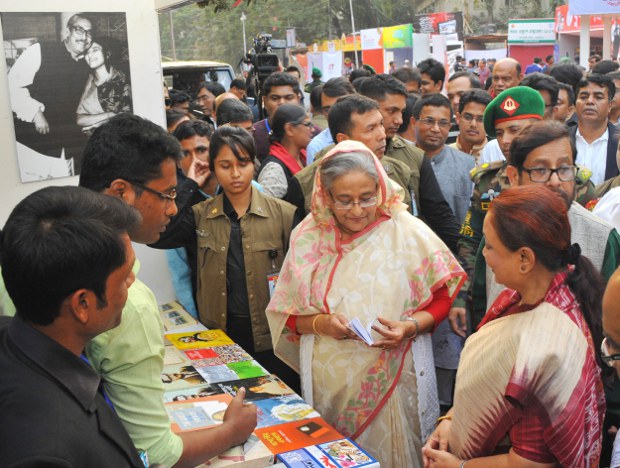Bangladesh: Police Vow to Keep Blasphemous Books from Literary Festival
2017.02.02
Dhaka
 Bangladesh Prime Minister Sheikh Hasina leafs through a book during the opening of the Ekushey Book Fair in Dhaka, Feb. 1, 2017.
Bangladesh Prime Minister Sheikh Hasina leafs through a book during the opening of the Ekushey Book Fair in Dhaka, Feb. 1, 2017.
Two years after a secular blogger was slain as he left the Ekushey Book Fair, the month-long literary festival opened in Dhaka this week as organizers and police restricted displays of publications that “could hurt religious sentiment.”
Before Prime Minister Sheikh Hasina opened the annual fair on Wednesday, Dhaka Metropolitan Police (DMP) Commissioner Md Asaduzzaman Mia warned writers and publishers not to display books considered to be “blasphemous.”
His comments have drawn criticism from writers, publishers and lawyers who described this as a move by Bangladesh’s government to restrict free speech and secular expression.
“Intelligence surveillance will be put in place so that no such books can enter the book fair,” Mia had told reporters, adding assurances that the police presence would not hamper the festival.
“But hurting someone’s religious sentiments, instigating sectarian strife, infringing others fundamental rights on the pretext of free thinking are not free thinking,” Mia said.
Writers and the publishers said the police lacked necessary manpower and expertise to scrutinize and decide if books are blasphemous.
“Around 4,000 books are published at the book fair every year. Will the police read every book? Does the metropolitan police have the manpower to finish reading of the books in one month to detect [blasphemy],” journalist Harunur Rashid wrote in a column published by banglatribune.
‘Being used as a weapon’
Lawyers questioned the legality of the police’s plans.
“The government has been putting up some restrictions on freedom of speech as part of its strategy to fight the militants. But the moves infringe on people’s constitutional rights,” lawyer Monzil Morshed told BenarNews. “Our penal code contains a section against hurting religious sentiments. This section is being used as a weapon.”
Attorney Jotimoy Barua acknowledged that the country’s penal code outlaws the harming of religious sentiment but, he said, police “have no authority to keep vigil on publishing houses.”
Social media users criticized the plan as well.
Writer Harunur Rashid said he and other colleagues were worrying about pressure from the authorities.
“They [writers] are being forced to go for self-censorship. So, free thinking will stumble,” he told BenarNews.
Publisher Srabon Prokashoni agreed.
“This is not a duty of police to decide what a book should contain and what [it] should not. We condemn this decision,” Publisher Robin Ahsan, proprietor of Srabon Prokashoni, told BenarNews.
‘Good sense prevails’
Religious extremists in the predominantly Muslim country have threatened writers and publishers at previous book fairs over publications that promote secularism and skeptical viewpoints.
On Feb. 26, 2015, militants killed Bangladesh-born secular writer Avijit Roy, a U.S. citizen, as he left the fair. His wife, Rafida Bonya Ahmed, was seriously injured in the attack near the Dhaka University, the festival’s venue.
The attack was similar to one in 2004, when suspected militants hacked to death Humayun Azad, whose writings against Islamic zealots apparently make him a target. He died of his injuries three months later.
In October 2015, Faisal Arefin Dipan, who published Roy’s books, was hacked to death at his at his office in Dhaka. Militants attacked another publishing house that day, injuring owner Ahmedur Rashid Tutul, along with bloggers Tareq Rahim and Ranadipam Basu.
At last year’s Ekushey fair, the stall belonging to Dipan’s publishing house, Jagriti Publications, featured a banner honoring Dipan, which bore his portrait with the words “Good Sense Prevails on Everyone.” The stall did not display any of Roy’s books. Dipan’s widow, Razia Rahman, said the company had stopped publishing “for security or other reasons.”
Book bans
In 2015, a Bengali translation of a book “Nobi Mohammader 23 Bochhor” (“23 Years: A Study of the Prophetic Career of Mohammad”), authored by Iranian writer Ali Dashti, was banned at the fair and the publishing house Rodela Prokashoni stall was closed.
Last year, the book “Islam Bitorko” (“Debates over Islam”) was confiscated and charges were filed under section 57 of the Information and Communication Technology Act against the book’s editor and publisher, Shamsuzzoha Manik, and three others. Publishing house Badwip’s stall was closed as well.
This year, the Bangla Academy, the literary group that organizes the annual fair, did not allocate stall space for Srabon Prokashoni after proprietor Robin Ahsan protested actions against Badwip in 2016. Bangla Academy relented following protests from other publishers.







